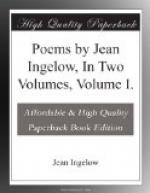So grave, so wondering, so content,
As one new waked to conscious life,
Whose sudden joy with fear is blent,
He
said, “My wife.”
“My wife, how beautiful you are!”
Then closer at her side reclined,
“The bold brown woman from afar
Comes,
to me blind.
“And by comparison, I see
The majesty of matron grace,
And learn how pure, how fair can be
My
own wife’s face:
“Pure with all faithful passion, fair
With tender smiles that come and go,
And comforting as April air
After
the snow.
“Fool that I was! my spirit frets
And marvels at the humbling truth,
That I have deigned to spend regrets
On
my bruised youth.
“Its idol mocked thee, seated nigh,
And shamed me for the mad mistake;
I thank my God he could deny,
And
she forsake.
“Ah, who am I, that God hath saved
Me from the doom I did desire,
And crossed the lot myself had craved,
To
set me higher?
“What have I done that He should bow
From heaven to choose a wife for me?
And what deserved, He should endow
My
home with THEE?
“My wife!” With that she turned her face
To kiss the hand about her neck;
And I went down and sought the place
Where
leaped the beck—
The busy beck, that still would run
And fall, and falter its refrain;
And pause and shimmer in the sun,
And
fall again.
It led me to the sandy shore,
We sang together, it and I—
“The daylight comes, the dark is o’er,
The
shadows fly.”
I lost it on the sandy shore,
“O wife!” its latest murmurs
fell,
“O wife, be glad, and fear no more
The
letter L.”
THE HIGH TIDE ON THE COAST OF LINCOLNSHIRE.
(1571.)
The old mayor climbed the belfry tower,
The ringers ran by two, by three;
“Pull, if ye never pulled before;
Good ringers, pull your best,” quoth
he.
“Play uppe, play uppe, O Boston bells!
Ply all your changes, all your swells,
Play uppe ‘The Brides
of Enderby.’”
Men say it was a stolen tyde—
The Lord that sent it, He knows all;
But in myne ears doth still abide
The message that the bells let fall:
And there was nought of strange, beside
The nights of mews and peewits pied
By millions crouched on the
old sea wall.
I sat and spun within the doore,
My thread brake off, I raised myne eyes;
The level sun, like ruddy ore,
Lay sinking in the barren skies;
And dark against day’s golden death
She moved where Lindis wandereth,
My sonne’s faire wife, Elizabeth.
“Cusha! Cusha!
Cusha!” calling,
Ere the early dews were falling,
Farre away I heard her song.
“Cusha! Cusha!” all along;
Where the reedy Lindis floweth,
Floweth, floweth.
From the meads where melick groweth
Faintly came her milking song—




